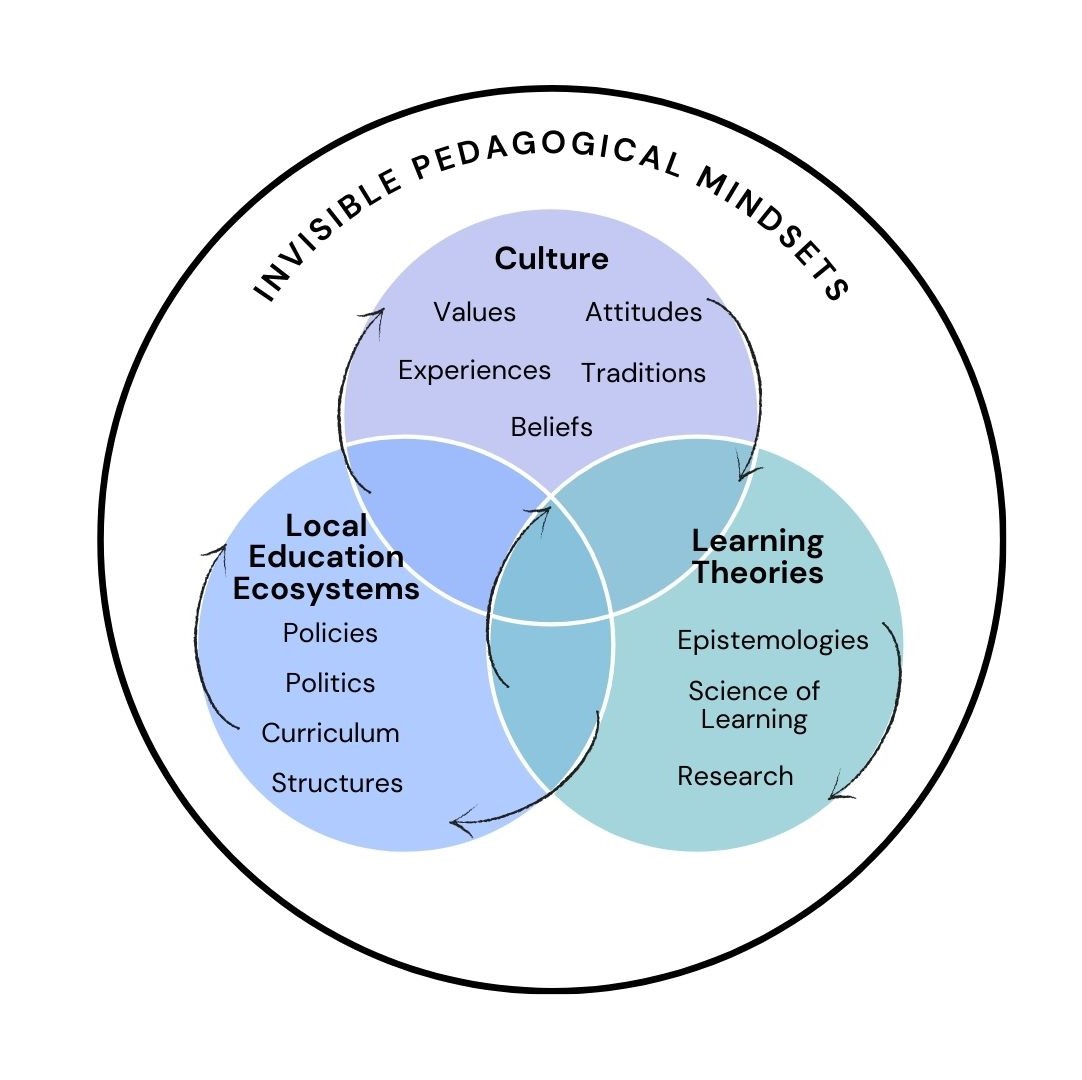Pedagogy is often defined by what we can see – the physical act of teaching and the methods used to impart knowledge in the classroom. However, beneath the surface, intangible and contextual factors inform pedagogy by shaping teacher choices and student learning experiences. We contend that many reforms focused on implementing innovative pedagogies do not adequately consider the intangible elements of pedagogy such as culture, education ecosystems, and learning theories embedded in local contexts. We use the term Invisible Pedagogical Mindsets to encompass these multi-faceted, interconnected, and unobservable elements that impact pedagogical approaches in the classroom.

To examine the impact of Invisible Pedagogical Mindsets in local contexts, the SPARKS team at the Center for Universal Education is excited to announce the launch of Research Policy Collaboratives in Egypt, India, and Mexico in collaboration with three local Facilitating Partner organizations: the Initiative for Self-Discovery and Development (Egypt), Dream a Dream (India), and Education for Sharing (Mexico). Based on the Research Practice Partnership model for long-term, mutually beneficial collaborative research that aims to bridge the gap between research, policy, and practice, the Research Policy Collaboratives will serve as local hubs for collaborative research on pedagogies. In each local context, the Research Policy Collaboratives will bring together policymakers, educators, researchers, parents, students, and other community collaborators from the local education ecosystems to discuss how pedagogical research, and specifically how Invisible Pedagogical Mindsets can contribute to or hinder education system transformation.
We purposefully selected the three SPARKS Facilitating Partners based on multiple consultations, a situational analysis, and an evaluation of the organizations for best fit based on the project’s design and objectives. SPARKS Facilitating Partners will help lead the research process in-country, provide local knowledge and expertise, and identify other community collaborators that are interested in examining how Invisible Pedagogical Mindsets affect teaching and learning in their context. Community collaborators will provide guidance to SPARKS Facilitating Partners and discuss research questions, design, methodologies, findings, and the best ways to disseminate findings to impact policy. Additionally, the three Research Policy Collaboratives will be connected as part of the SPARKS-Global Network to share lessons learned across contexts about the role of Invisible Pedagogical Mindsets in enabling or hindering the adoption of new pedagogical reforms and the challenges and opportunities of conducting collaborative research.
Please see below a description of each of the SPARKS Facilitating Partner organizations and their motivations for joining the SPARKS Project.
Egypt – Initiative for Self Discovery and Development
The Initiative for Self-Discovery and Development (ISDD) is an Egyptian non-profit organization that works in regenerative living and learning by promoting popular education, conducting critical and applied research, weaving local and global networks to create alternative education imaginaries, and community organizing. ISDD aims to foster an environment that enables critical inquiry, self-reflection, and civic engagement among vulnerable learners from diverse walks of life, host a scholarly cooperative to amplify, embody and co-create critical and popular knowledge, and create spaces for practicing new visions of the world.
At ISDD, we are thrilled to be part of SPARKS. Four concepts capture our excitement: timeliness, opportunity, applied possibilities, and elevation of silenced voices. SPARKS provides a timely opportunity to create an applied research community in Egypt that is focused on education. The Egypt Research Policy Collaborative will bring together multiple relevant stakeholders from the field of education, including those that do not have a regular seat at the table, to conduct independent and rigorous research driven by the community’s priorities. Additionally, SPARKS aligns with ISDD’s commitment to conduct critical research through flipping power dynamics in research projects and to empower all relevant stakeholders to co-create the research agenda and priorities.
India – Dream a Dream
Dream a Dream is an Indian nonprofit organization working to transform the experience of education for the 130+ million children living in poverty in India. We aim to change the purpose of education towards the idea of thriving for every child. Since 1999, Dream a Dream has mainstreamed life skills as a critical approach to help children overcome adversity and learn to thrive. Today, the organization is transforming the Indian education ecosystem through its programs, curriculum, pedagogical innovations, and the development of holistic assessment frameworks to shift the narratives around the purpose of education. Dream a Dream’s work is spread across six Indian states reaching over 2.2 million children through strategic partnerships with state governments and collaborations with other non-profits and funders in India.
Through the India SPARKS Research Policy Collaborative, we aim to delve deep into the beliefs, norms, biases, attitudes, and perceptions influencing the mindset of teachers. We recognize that authentic, non-judgmental, and empathetic teachers have the power to transform young people’s lives, particularly for children from vulnerable backgrounds. Our work is grounded in the belief that the influence of caring, compassionate adults plays a vital role in shaping the futures of young individuals. Our approach is to shift teacher mindsets towards fostering safe and inclusive spaces where every child can thrive. With SPARKS, we aspire to bridge the gap between research, practice, and policy, ensuring that evidence-based insights shape the teacher education approaches and influence the educational policy of the country.
Mexico – Educacion para Compartir
Education for Sharing (E4S) is an international organization that forms better global citizens through innovative education. E4S is committed to providing meaningful experiences for all, leveraging our unique methodology that harnesses the power of play, reflection, and our inherent capacity to shape our own reality. Established 17 years ago in Mexico, E4S has worked with over 1.8 million individuals from the educational community across thirteen countries.
Education for Sharing is excited to lead the Mexico SPARKS Research Policy Collaborative. We aim to work with members to understand the challenges and opportunities for pedagogical change within teaching practices in Mexico and collaboratively devise strategies with the educational community to enrich and complement their roles within the classroom. We are thrilled at the prospect of listening and learning from other members, as well as sharing knowledge with the India and Egypt Research Policy Collaboratives.
Please stay tuned for updates from SPARKS on research and other relevant activities.



Commentary
Introducing SPARKS Research Policy Collaboratives
May 3, 2024